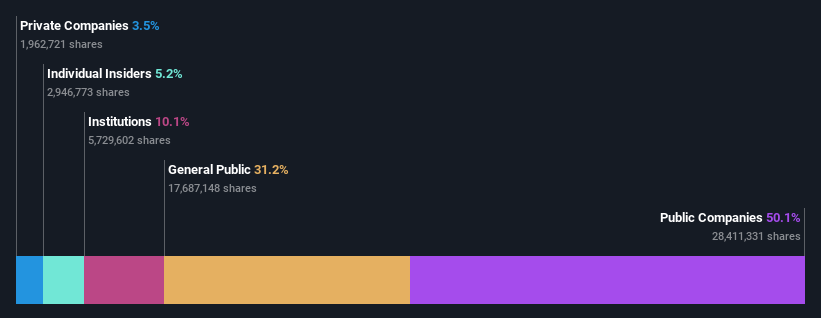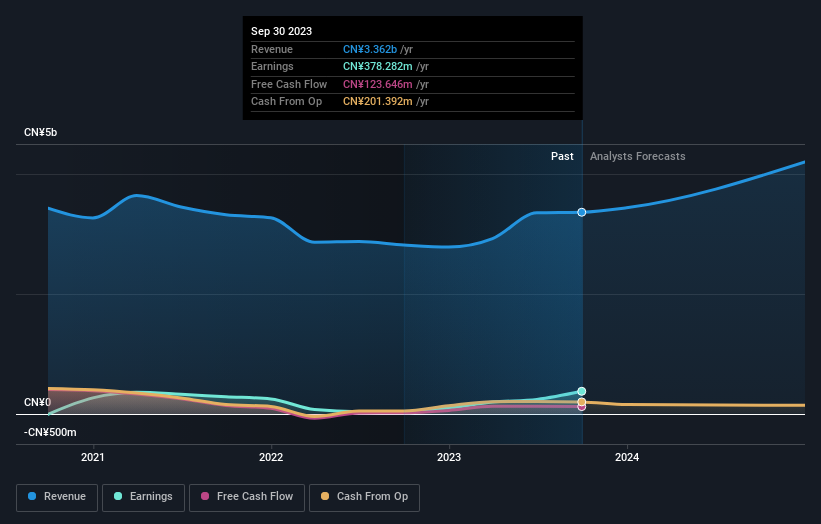Public companies account for 50% of Fanhua Inc.'s (NASDAQ:FANH) ownership, while individual investors account for 31%
Key Insights
Fanhua's significant public companies ownership suggests that the key decisions are influenced by shareholders from the larger public
The largest shareholder of the company is Puyi Inc. with a 50% stake
A look at the shareholders of Fanhua Inc. (NASDAQ:FANH) can tell us which group is most powerful. And the group that holds the biggest piece of the pie are public companies with 50% ownership. That is, the group stands to benefit the most if the stock rises (or lose the most if there is a downturn).
And individual investors on the other hand have a 31% ownership in the company.
Let's delve deeper into each type of owner of Fanhua, beginning with the chart below.
View our latest analysis for Fanhua
What Does The Institutional Ownership Tell Us About Fanhua?
Institutional investors commonly compare their own returns to the returns of a commonly followed index. So they generally do consider buying larger companies that are included in the relevant benchmark index.
We can see that Fanhua does have institutional investors; and they hold a good portion of the company's stock. This can indicate that the company has a certain degree of credibility in the investment community. However, it is best to be wary of relying on the supposed validation that comes with institutional investors. They too, get it wrong sometimes. It is not uncommon to see a big share price drop if two large institutional investors try to sell out of a stock at the same time. So it is worth checking the past earnings trajectory of Fanhua, (below). Of course, keep in mind that there are other factors to consider, too.
Hedge funds don't have many shares in Fanhua. The company's largest shareholder is Puyi Inc., with ownership of 50%. This essentially means that they have extensive influence, if not outright control, over the future of the corporation. With 4.3% and 3.5% of the shares outstanding respectively, Peng Ge and Kingsford Resources Limited are the second and third largest shareholders. Peng Ge, who is the second-largest shareholder, also happens to hold the title of Chief Financial Officer. In addition, we found that Yinan Hu, the CEO has 0.9% of the shares allocated to their name.
While studying institutional ownership for a company can add value to your research, it is also a good practice to research analyst recommendations to get a deeper understand of a stock's expected performance. There is a little analyst coverage of the stock, but not much. So there is room for it to gain more coverage.
Insider Ownership Of Fanhua
The definition of an insider can differ slightly between different countries, but members of the board of directors always count. The company management answer to the board and the latter should represent the interests of shareholders. Notably, sometimes top-level managers are on the board themselves.
I generally consider insider ownership to be a good thing. However, on some occasions it makes it more difficult for other shareholders to hold the board accountable for decisions.
Our most recent data indicates that insiders own some shares in Fanhua Inc.. In their own names, insiders own US$19m worth of stock in the US$365m company. It is good to see some investment by insiders, but it might be worth checking if those insiders have been buying.
General Public Ownership
With a 31% ownership, the general public, mostly comprising of individual investors, have some degree of sway over Fanhua. While this group can't necessarily call the shots, it can certainly have a real influence on how the company is run.
Private Company Ownership
Our data indicates that Private Companies hold 3.5%, of the company's shares. It's hard to draw any conclusions from this fact alone, so its worth looking into who owns those private companies. Sometimes insiders or other related parties have an interest in shares in a public company through a separate private company.
Public Company Ownership
It appears to us that public companies own 50% of Fanhua. It's hard to say for sure but this suggests they have entwined business interests. This might be a strategic stake, so it's worth watching this space for changes in ownership.
Next Steps:
I find it very interesting to look at who exactly owns a company. But to truly gain insight, we need to consider other information, too. Be aware that Fanhua is showing 4 warning signs in our investment analysis , and 2 of those shouldn't be ignored...
If you are like me, you may want to think about whether this company will grow or shrink. Luckily, you can check this free report showing analyst forecasts for its future.
NB: Figures in this article are calculated using data from the last twelve months, which refer to the 12-month period ending on the last date of the month the financial statement is dated. This may not be consistent with full year annual report figures.
Have feedback on this article? Concerned about the content? Get in touch with us directly. Alternatively, email editorial-team (at) simplywallst.com.
This article by Simply Wall St is general in nature. We provide commentary based on historical data and analyst forecasts only using an unbiased methodology and our articles are not intended to be financial advice. It does not constitute a recommendation to buy or sell any stock, and does not take account of your objectives, or your financial situation. We aim to bring you long-term focused analysis driven by fundamental data. Note that our analysis may not factor in the latest price-sensitive company announcements or qualitative material. Simply Wall St has no position in any stocks mentioned.

 Yahoo Finance
Yahoo Finance 

